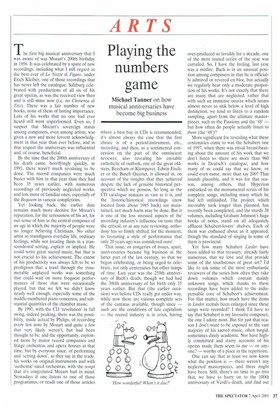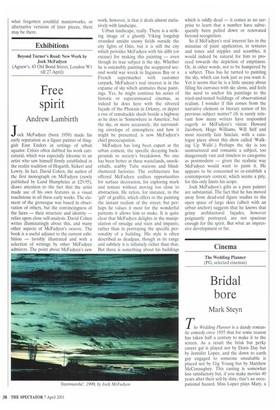Playing the numbers game
Michael Tanner on how musical anniversaries have become big business
The first big musical anniversary that I was aware of was Mozart's 200th birthday in 1956. It was celebrated by a spate of new recordings, including what I still regard as the best ever of Le Nozze di Figaro, under Erich Kleiber, one of those recordings that has never left the catalogue. Salzburg celebrated with productions of all six of his great operas, as was the received view then and is still mine now (i.e. no Clemenza di Tito). There was a fair number of new books, none of them of lasting importance. Lots of his works that no one had ever heard still went unperformed. Even so, I suspect that Mozart's sovereign status among composers, even among artists, was given a new and more fervent acknowledgment in that year than ever before, and in that respect the anniversary was influential and, of course, beneficial.
By the time that the 200th anniversary of his death came, horrifyingly quickly, in 1991, there wasn't much revaluing to be done. The record companies were much busier with him in that year than they had been 35 years earlier, with numerous recordings of previously neglected works, and lots more of familiar ones, especially of the Requiem in various completions.
Yet looking back, the earlier date remains much more decisive for Mozart's reputation, for the seriousness of his art, for our sense of him as the central composer of an age in which the majority of people were no longer believing Christians. No other artist so transfigures everyday life, ordinary feelings, while not locating them in a transcendental setting, explicit or implied. He could write great sacred music, but that is not crucial to his achievement. The extent of his productivity was always felt to be so prodigious that a trawl through the innumerable unplayed works was something that could wait on more frequent performances of those that were occasionally played, but that we felt we didn't know nearly well enough, especially some of the middle-numbered piano concertos, and substantial quantities of the chamber music.
By 1991, with the CD 'revolution' in full swing, indeed peaking, there was the possibility, made actual by Philips, of recording every last note by Mozart and quite a few that very likely weren't, but had been thought to be; and the opportunity, exploited more by minor record companies and fringe orchestras and opera houses at that time, but by everyone since, of performing and 'setting down', as they say in the trade, his works on original instruments and with 'authentic'-sized orchestras, with the tempi that it's conjectured Mozart had in mind. Nowadays if one listens to one of those programmes, or reads one of those articles where a best buy in CDs is recommended, it's almost always the case that the first choice is of a period-instrument, etc., recording, and then, as a sentimental concession on the part of the omniscient reviewer, also revealing his enviable catholicity of outlook, one of the great oldsters, Beecham or Klemperer, Edwin Fischer or the Busch Quartet, is allowed in, on account of the insights that they achieved despite the lack of genuine historical perspective which we possess. So long as the CD catalogue remains as vast as it is, and the historic/historical recordings (now located from about 1985 back) are maintained, not much harm may be done. But it is one of the less stressed aspects of the recording industry's influence on taste that the critical, or at any rate reviewing, orthodoxy has so firmly shifted, for the moment, to favouring a style of performance that only 20 years ago was considered outré.
That issue, or congeries of issues, apart, anniversaries became big business in the latter part of the last century, so that we began celebrating, or being urged to celebrate, not only centenaries but other lumps of time. Last year was the 250th anniversary of Bach's death, though we had had the 300th anniversary of his birth only 15 years earlier. But that (the earlier occasion) was before CDs really got under way, while now there are various complete sets of the cantatas available, though since — such are the conditions of late capitalism — the record industry is in crisis, having over-produced so lavishly for a decade, one of the most touted series of the year was curtailed. So, I have the feeling, last year was a misfire. Bach is in an unusual position among composers in that he is officially admired or revered en bloc, but actually we regularly hear only a moderate proportion of his works. It's not exactly that there are many that are neglected, rather that with such an immense oeuvre which seems almost never to sink below a level of high distinction, we tend to listen to a random sampling, apart from the ultimate masterpieces, such as the Passions and the '48' — but how often do people actually listen to them (the `487?
More significant for revealing what these centenaries come to was the Schubert one of 1997, when there was ritual breast-beating about the amount of his work that we don't listen to: there are more than 960 works in Deutsch's catalogue, and how many of us could say that we know, or could even name, more than say 200? That sounds plausible, and it was for that reason, among others, that Hyperion embarked on the monumental series of his complete songs, including many which he had left unfinished. The project, which inevitably took longer than planned, has recently been completed, and the sturdy 38 volumes, including Graham Johnson's huge books of notes, stand on all adequately affluent Schubert-lovers' shelves. Each of them was enthused about as it appeared, though the standard of singing in some of them is provincial.
Yet how many Schubert Lieder have been added to that treasury, already fairly numerous, that we love and that provide some of the touchstones of great art? I'd like to ask some of the most enthusiastic reviewers of the series how often they take down volumes which contain mainly unknown songs, which thanks to these recordings have been added to the indispensable core of Schubert's achievement. For that matter, how much have the items in Lieder recitals been enlarged since these songs were recorded? I think I'd have to Say that Schubert is my favourite composer, the one I adore most. But for just that reason I don't want to be exposed to the vast majority of his sacred music, often turgid, sometimes direly academic. Nor have highly committed and starry accounts of his operas made them seem to me — or anyone? — worthy of a place in the repertoire.
One can say that at least we now know what the position is — there weren't any neglected masterpieces, and there might have been. Still, there's no time to go into that, we have to hurry on to the 100th anniversary of Verdi's death, and find out what forgotten youthful masterworks, or alternative versions of later pieces, there may be there.



























































 Previous page
Previous page